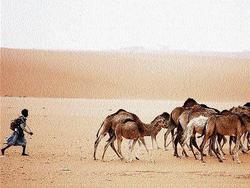
A Mauritanian man herds camels near the ancient desert town of Changuetti, 500km north-east of the capital Nouakchott in this March 10 picture. Herding camels or goats out in the sun-blasted dunes of the Sahara, or serving hot mint tea to guests in Nouakchott villas, is the domain of many slaves in the north-west African country. - Reuters
NOUAKCHOTT, Mauritania (Reuters):
They do not wear chains, nor are they branded with the mark of their masters, but slaves still exist in Mauritania.
In the Saharan Islamic state, a centuries-old system of bondage is resisting the rise of democracy in the largely desert former French colony.
Serving hot mint tea
Herding camels or goats out in the sun-blasted dunes of the Sahara, or serving hot mint tea to guests in the richly carpeted villas of Nouakchott, Mauritanian slaves serve their masters and are passed on as family chattels from generation to generation.
They may number thousands, anti-slavery activists say. A shocking anomaly in the 21st century, this is widely accepted in a racially diverse, hierarchical society dominated by a Moorish elite and a brand of Islam that preaches submission.
"It's like having sheep or goats. If a woman is a slave, her descendants are slaves," said Boubacar Messaoud, who was born a slave and is now his country's leading anti-slavery campaigner.
He says a 1981 decree outlawing slavery is a dead letter and slavery is alive in Mauritania, with all its manifestations of non-paid work, punishment, forced sex and other abuses.
Mauritania's military rulers, who are handing over to civilian rule in democratic elections, shy away from discussing the issue and prefer to talk of "vestiges of slavery".
Some members of the light-skinned elite which has traditionally ruled the country deny slavery exists at all. Questions about it can draw anger, mistrust and silence.
But anti-slavery campaigners say the master-slave relationship and its social repercussions are branded into the minds of all Mauritanians, just as class consciousness still haunts social discourse in Britain and other European states.
"There is slavery in our country, in all of our society. You need laws to eliminate it. The fact people try to hide what exists just complicates things," said Messaoud Ould Boulkheir, a black Mauritanian and descendant of slaves.
In Nouakchott's sprawling, dirt-poor slums, most of whose inhabitants are black, the testimonies about enduring slavery are repeated, and heartfelt.
"Yes, it's true," said Abdarahman Ould Mohamed Abd, 52, sitting outside his ramshackle hut. "In the interior of the country, it's the worst. You see it in the way some people treat others. Sometimes, they (the masters) have even killed children," the street vendor added, his own surname meaning 'son of Mohamed Slave'.
Anti-slavery groups, such as SOS-Slaves run by Messaoud, say the fear and secrecy cloaking the issue make it difficult to bring cases of slavery to light, let alone to court.
But victims periodically surface, such as Matalla, a black Mauritanian who two years ago escaped from members of a Berber warrior tribe, the Reguibat. They were holding him and his family in the isolated deserts of north-east Mauritania.
"I was born a slave. All my family, all my ancestors were slaves of that group. My aunt, my brothers are still slaves with them," he said with lowered gaze.
He told Reuters he herded camels for his masters, ate only leftovers from their table and suffered occasional beatings.
"I have a scar here," he said, pointing to his right cheekbone, "from where they hit me with a stick."
Anti-slavery activists say it is impossible to tell how many people remain enslaved in Mauritania, a mineral-rich country twice the size of France whose three million population mixes white and black Moors and black Mauritanians of several ethnic groups.
Sidi Mohamed Ould Cheikh Abdallahi and Ahmed Ould Daddah, two white Moor front-runners who yesterday faced off in a presidential run-off, last week pledged they would toughen anti-slavery legislation. But uprooting a tradition which has been core to Mauritania's history may be more difficult than political bluster would suggest.
Historians say slavery developed in Mauritania from the 7th century, when Arab invaders pushed south into sub-Saharan Africa, bringing Islam which explicitly allowed the enslavement of non-believers.
This blossomed into a trans-Saharan trade that captured black Africans several centuries before the peak of the European-run Atlantic slave trade. Some historians argue the practice of slavery already existed in black Africa.
Black Mauritanians tell tales of oppression, victimisation

